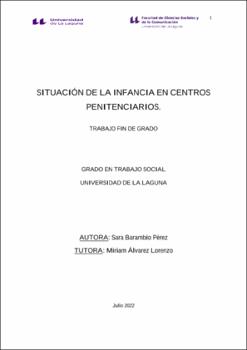Situación de la Infancia en centros penitenciarios.
Autor
Barambio Perez, SaraFecha
2022Resumen
En el siguiente Trabajo de Fin de Grado, se pretende analizar a través de una
revisión bibliográfica las necesidades existentes de los niños y niñas que residen en
centros penitenciarios con alguno de sus progenitores o ambos de ellos. Se ha aplicado
una revisión sistemática siguiendo el protocolo PRISMA.
Las bases de datos de las que se ha hecho uso han sido ScIELO, Punto Q, y
Dialnet con una serie de palabras clave:("infancia" OR "niño" OR "niña" OR "menores"
OR "minoría de edad" OR "Niñez" OR "puericia") AND ("centros penitenciarios" OR
"Cárcel" OR "centro de detención" OR "privación de libertad" OR "Reclusos" OR
"reclusas") AND (" progenitores" OR "madres). Se ha realizado la metodología según el
protocolo PRISMA como se ha mencionado anteriormente, incluyendo de esta manera
diez artículos, en los que se han analizado diversas consecuencias y necesidades de la
infancia reclusa. El instrumento más utilizado para medir las necesidades y
consecuencias y para analizar el desarrollo de las etapas vitales de la persona, ha sido
la entrevista. Por otro lado, la muestra de ciertos documentos fue recogida por niños y
niñas, pero también por padres y madres reclusos/as, debido a que se realizaron análisis
de la etapa infantil de cada uno de ellos/as para así descubrir el origen de ciertas
necesidades y problemáticas. Este trabajo trata de recopilar y observar la información
necesaria para saber la situación en la que se encuentran los y las menores que están en
los centros penitenciarios y poder así analizar cuál es la base de esta problemática
social.
Todo ello, con el objetivo principal de conocer cómo es la situación de la
infancia reclusa, desde el análisis de artículos, y bajo la lectura de la literatura
actualizada (desde el año 2015 hasta 2022),. Además para comprender si se lleva a
cabo la protección al menor en los centros penitenciarios o si por el contrario se han de
desarrollar más estudios que ayuden a visibilizar esta situación y por tanto disminuir el
riesgo social de estos. In the following Final Degree Project, the aim is to analyze through a literature
review the existing needs of children living in prisons with one or both of their parents.
A systematic review has been applied following the PRISMA protocol.
The databases used were ScIELO, Punto Q, and Dialnet with a series of key
words:("infancy" OR "child" OR "child" OR "girl" OR "minors" OR "minority" OR
"childhood" OR "puericia") AND ("penitentiary centers" OR "prison" OR "detention
center" OR "deprivation of liberty" OR "inmates" OR "prisoners" OR "inmates") AND
(" parents" OR "mothers"). The methodology was carried out according to the PRISMA
protocol as mentioned above, thus including ten items, in which various consequences
and needs of incarcerated children were analyzed. The instrument most used to measure
the needs and consequences and to analyze the development of the person's vital stages
has been the interview. On the other hand, the sample of certain documents was
collected from children, but also from imprisoned fathers and mothers, due to the fact
that analyses of the childhood stage of each of them were carried out in order to
discover the origin of certain needs and problems. This work tries to compile and
observe the necessary information to know the situation in which the minors who are in
the penitentiary centers find themselves and to be able to analyze the basis of this social
problem.
All this, with the main objective of knowing how is the situation of children in
prison, from the analysis of articles, and under the reading of updated literature (from
2015 to 2022),. In addition to understand if child protection is carried out in prisons or
if, on the contrary, more studies have to be developed to help to make this situation
visible and therefore reduce the social risk of these.





